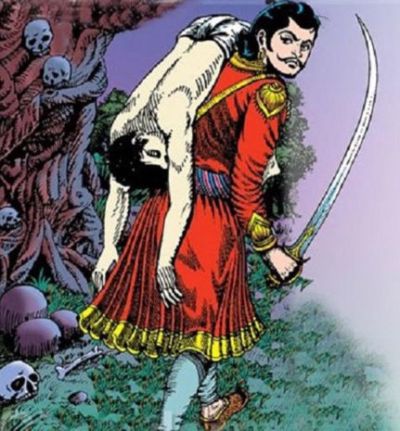“Where are those ancestors of ours, who always thought this tree to be their personal possession? For which of them does it still exist, and which of them exists for it?”
“And so, if you permit me father, I would like to worship this kalpa-vrksha, the one that grants all desires, and obtain from it something that can be beneficial to the whole of humanity.”

एवम् अस्त्व् इति पित्रा च दत्तानुज्ञो ऽथ तेन सः ।
जीमूतवाहनो गत्वा कल्पद्रुमम् उवाच तम् ॥ १२,२३.२४ ॥
अभीष्टाः पूरिताः कामाः पूर्वेषां देव नस् त्वया ।
तन् ममैकम् इमं कामम् अनन्यं परिपूरय ॥ १२,२३.२५ ॥
अदरिद्रां यथा पृथ्वीम् इमां द्रक्ष्ये तथा कुरु ।
भद्रं ते व्रज दत्तो ऽसि लोकायार्थार्थिने मया ॥ १२,२३.२६ ॥
इत्य् उक्तवति जीमूतवाहने रचिताञ्जलौ ।
त्यक्तस् त्वयैषो जातो ऽस्मीत्य् उदभूद् वाक् तरोस् ततः ॥ १२,२३.२७ ॥
क्षणाच् चोत्पत्य स दिवं कल्पवृक्षस् तथा वसु ।
ववर्ष भुवि नैवासीत् को ऽप्य् अस्यां दुर्गतो यथा ॥ १२,२३.२८ ॥
ततस् तस्य तया तीव्रसर्वसत्त्वानुकम्पया ।
जीमूतवाहनस्यात्र त्रैलोक्ये पप्रथे यशः ॥ १२,२३.२९ ॥
तेन तद्गोत्रजाः सर्वे मात्सर्याद् असहिष्णवः ।
तं लोकसात्कृतार्तिघ्नकल्पवृक्षविनाकृतम् ॥ १२,२३.३० ॥
जेयं सपितृकं मत्वा संभूय कृतनिश्चयाः ।
युद्धाय समनह्यन्त तद् राज्यापजिहीर्षया ॥ १२,२३.३१ ॥
तद् दृष्ट्वा प्राह पितरं स्वं स जीमूतवाहनः ।
तात कस्यापरस्यास्ति शक्तिस् त्वयि धृतायुधे ॥ १२,२३.३२ ॥
किं त्व् अस्य पापकस्यार्थे शरीरस्य विनाशिनः ।
हत्वा बन्धून् अकृपनो राज्यं को नाम वाञ्छति ॥ १२,२३.३३ ॥
His father felt proud when he heard Jīmūtavāhana speak this way, and agreed to his suggestion.
And so Jīmūtavāhana went to the kalpa-vrksha, bowed before it with folded hands, and said…
“Oh divina vrksha, you have fulfilled the wishes of all my ancestors. And today I ask you to fulfill just one wish of mine…”
“Please make the whole world free from poverty, and then you can depart, for your work would have been fulfilled. I renounce you to the world that desires wealth, so that you can fulfill the wishes of all those who need your help…”
When Jīmūtavāhana said this, a voice spoke from the tree…
“You have renounced me, and so I depart.”
And so the kalpa-vrksha ascended to the skies, and rained wealth onto the earth, so much that there was not one poor man left, and the world was freed from famine and hunger.
Jīmūtavāhana became renowned in the three lokās, for his compassion towards all of humanity.
In the meanwhile, his own relatives started to plot against him. They had always been cautious, knowing that Jīmūtavāhana had access to the powerful kalpa-vrksha, but now that it was gone, they all got together so that they could conquer the kingdom.
When Jīmūtavāhana heard of their designs, he was anguished. He said to his father…
“Father, no one can stand before you in batle, if you choose to pick up your sword. But what kind of person would want to keep a kingdom, if he has to do so by killing his own relatives? Would it all be worth it, fighting and killing for this body, which itself is not permanent?”
तत् किं राज्येन नः कार्यं गत्वान्यत्र क्वचिद् वयम् ।
धर्मम् एव चरिष्यामो लोकद्वयसुखावहम् ॥ १२,२३.३४ ॥
मोदन्तां कृपणा एते दायादा राज्यलोलुपाः ।
इत्य् उक्तवन्तं जीमूतकेतुस् तं स पिताब्रवीत् ॥ १२,२३.३५ ॥
अहं त्वदर्थम् इच्छामि राज्यं पुत्र त्वम् एव चेत् ।
तज् जहासि कृपाविष्टस् तन् मे वृद्धस्य तेन किम् ॥ १२,२३.३६ ॥
एवं कृताभ्यनुज्ञेन पित्रा मात्रा च सो ऽन्वितः ।
मलयाद्रिम् अगात् त्यक्तराज्यो जीमूतवाहनः ॥ १२,२३.३७ ॥
तत्र चन्दनसंछन्नवहन् निर्झरकन्दरे ।
शुश्रूषमाणः पितरं स तस्थौ कल्पिताश्रमः ॥ १२,२३.३८ ॥
मित्रं चास्यात्र संपेदे मित्रावसुर् इति श्रुतः ।
विश्वावसोः सुतः सिद्धराजस्यैतन्निवासिनः ॥ १२,२३.३९ ॥
“So of what us is this kingdom to us?”
“Let us leave this place and go somewhere else, where we can lead a life of Dharma, and feel peaceful, and engage in activities that will benefit us in this world and the next. These miserable relatives of ours, can enjoy the kingdom to their satisfaction”.
When Jīmūtavāhana said this, his father, Jīmūtaketu, replied…
“My dear son, the only reason I desired a kingdom, was for your sake. If you do not desire it, of what use can it be to an old man like me?”
And so Jīmūtavāhana, his father and his mother, left that very night and went to the Malaya mountains. They made a small hut near a stream, one that was well-hidden by sandalwood trees, and lived a simple life, making do with whatever they could find, and caring for each other.
In the course of time, Jīmūtavāhana made a friend of the name of Mitrāvasu, the son of Viśvāvasu, the King of the Siddhas, who dwelt on that mountain.
One day…
to be continued…
